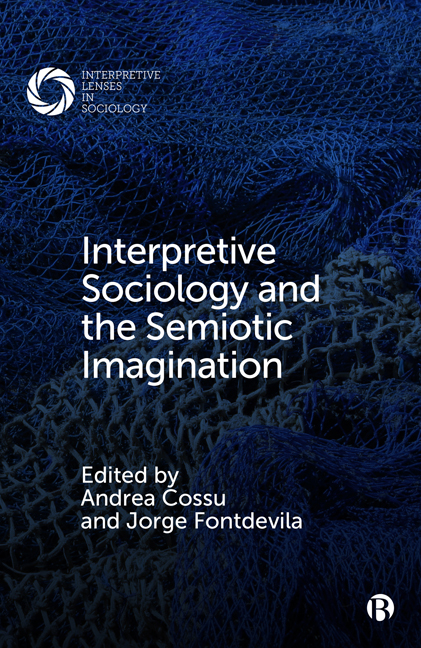Book contents
- Frontmatter
- Contents
- Series Editors’ Preface: Interpretive Lenses in Sociology—On the Multidimensional Foundations of Meaning in Social Life
- Notes on Contributors
- Introduction: Interpretive Sociology and the Semiotic Imagination
- 1 Marked and Unmarked: A Semiotic Distinction for Concept-driven Interpretive Sociology
- 2 Blumer, Weber, Peirce, and the Big Tent of Semiotic Sociology: Notes on Interactionism, Interpretivism, and Semiotics
- 3 Collective Agency: A Semiotic View
- 4 Theorizing Side-directed Behavior
- 5 Cultural Syntax and the Rules of Meaning-making: A New Paradigm for the Interpretation of Culture
- 6 Memory, Cultural Systems, and Anticipation
- 7 Stigma-embedded Semiotics: Indexical Dilemmas of HIV across Local and Migrant Networks
- 8 Supremacy or Symbiosis? The Effect of Gendered Ideologies of the Transhuman versus Posthuman on Wearable Technology and Biodesign
- Index
6 - Memory, Cultural Systems, and Anticipation
Published online by Cambridge University Press: 20 January 2024
- Frontmatter
- Contents
- Series Editors’ Preface: Interpretive Lenses in Sociology—On the Multidimensional Foundations of Meaning in Social Life
- Notes on Contributors
- Introduction: Interpretive Sociology and the Semiotic Imagination
- 1 Marked and Unmarked: A Semiotic Distinction for Concept-driven Interpretive Sociology
- 2 Blumer, Weber, Peirce, and the Big Tent of Semiotic Sociology: Notes on Interactionism, Interpretivism, and Semiotics
- 3 Collective Agency: A Semiotic View
- 4 Theorizing Side-directed Behavior
- 5 Cultural Syntax and the Rules of Meaning-making: A New Paradigm for the Interpretation of Culture
- 6 Memory, Cultural Systems, and Anticipation
- 7 Stigma-embedded Semiotics: Indexical Dilemmas of HIV across Local and Migrant Networks
- 8 Supremacy or Symbiosis? The Effect of Gendered Ideologies of the Transhuman versus Posthuman on Wearable Technology and Biodesign
- Index
Summary
The past, the present, and the future are different tonalities of temporality, which are best understood in a processual way. While memory studies have often approached the relation between the past and the present, the future still seems an uncharted territory, despite substantial contributions that investigate the issue of the “memory of the future” (Gutman et al, 2010). I connect the sociological reflection on memory and the past, the semiotic attention to semantic networks, and some recent literature on anticipation to argue that the future is a real territory for memory studies beyond the current state of the art. The direction the chapter proposes is that of a semiotic, cultural sociology. My analysis is grounded on a network-based formalization of the cultural system, and it attempts to depict an autonomous role of cultural encyclopedias and scripts (as a form of cultural memory) in the micro-level orientation to future action. This approach is useful to bring together— in the discussion of the interaction between memory and the future— the role of declarative and non-declarative culture (Lizardo, 2017), the nature of macro-micro mechanisms (Norton, 2014), and the process through which situations are made recognizable and orderly.
Prologue (Springsteen and I)
Trento, February 2021. It is somehow soothing to look back at a simple walk around the streets of London, as Italy is locked down due to a COVID-19 pandemic outbreak. In some sense, that's what memories are for: to look back and select suitable parts of the past in order to use them as a measure of the normality or abnormality of the present, and also to make projects about the future (“and as soon as this is over, I will take a long walk in a crowded place”).
Another long walk— London, September 2019, walking while rehearsing my talk for a conference— stopped in front of a movie theater, where I happily purchased a ticket to watch Blinded by the Light, a coming-of-age story of multicultural frictions and integrations, which is less notable for its originality in British cinema (East is East, Bend It Like Beckham) than it is for its focal point, its totemic reference, and its soundtrack: the myth and songs of Bruce Springsteen, at the time of his fast rush to global stardom in the 1980s.
- Type
- Chapter
- Information
- Interpretive Sociology and the Semiotic Imagination , pp. 140 - 157Publisher: Bristol University PressPrint publication year: 2023



